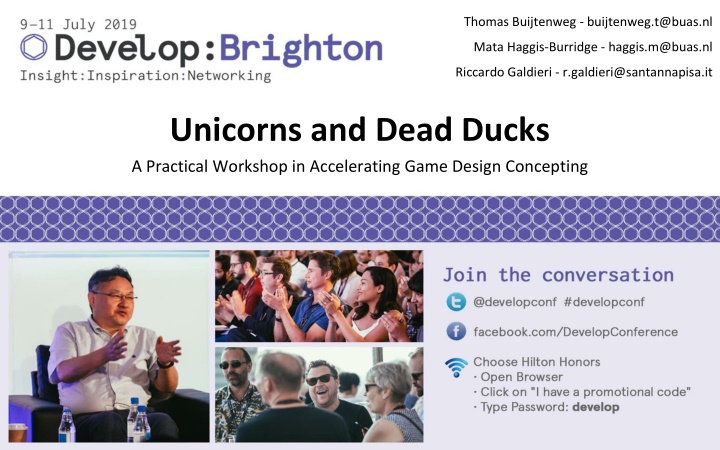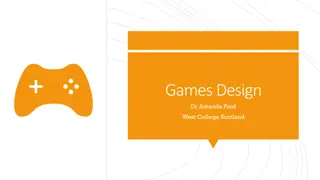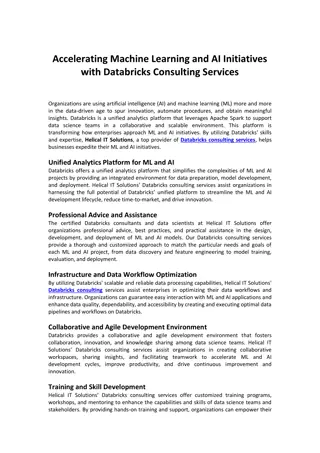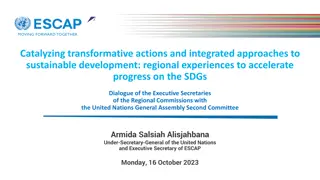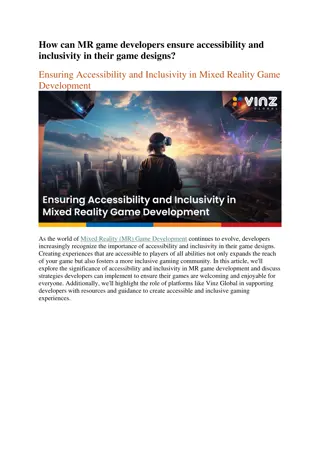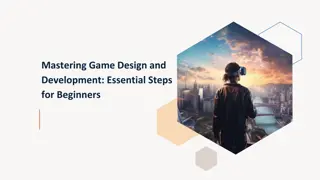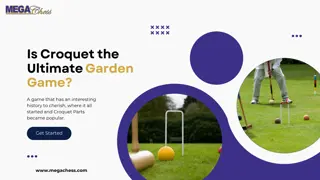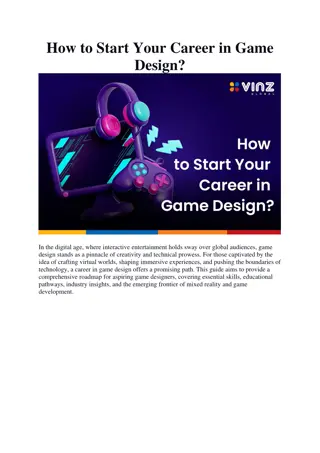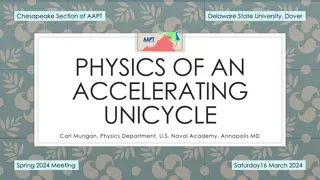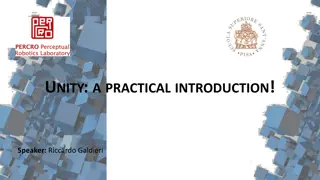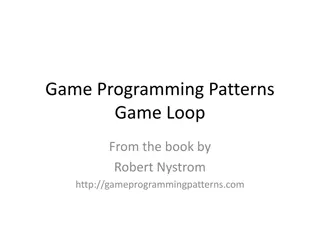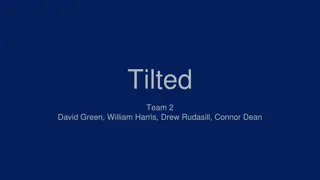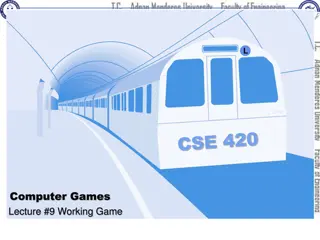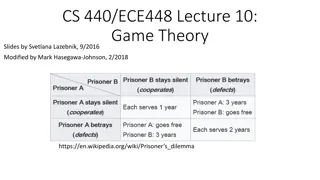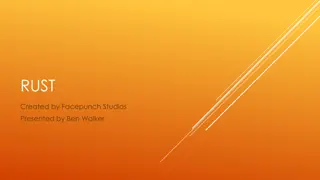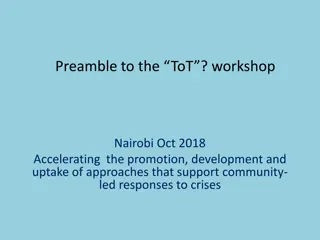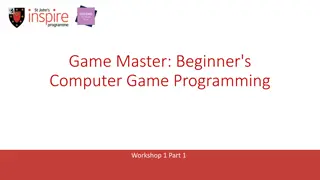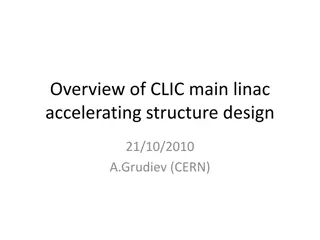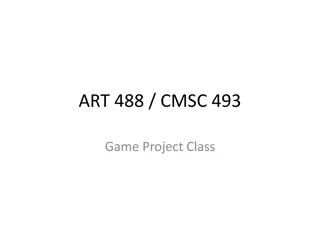Accelerating Game Design: Practical Workshop Overview
Explore a practical workshop outline for accelerating game design, focusing on ideation, user stories, and iterative processes. Learn about ideation cards, their usability, and enhancing game concepts for future projects. Delve into challenges faced post-game release and iterate successful elements for new projects. Presented by Thomas Buijtenweg, a Game Designer and Researcher from Breda University.
Download Presentation

Please find below an Image/Link to download the presentation.
The content on the website is provided AS IS for your information and personal use only. It may not be sold, licensed, or shared on other websites without obtaining consent from the author.If you encounter any issues during the download, it is possible that the publisher has removed the file from their server.
You are allowed to download the files provided on this website for personal or commercial use, subject to the condition that they are used lawfully. All files are the property of their respective owners.
The content on the website is provided AS IS for your information and personal use only. It may not be sold, licensed, or shared on other websites without obtaining consent from the author.
E N D
Presentation Transcript
Thomas Buijtenweg - buijtenweg.t@buas.nl Mata Haggis-Burridge - haggis.m@buas.nl Riccardo Galdieri - r.galdieri@santannapisa.it Unicorns and Dead Ducks A Practical Workshop in Accelerating Game Design Concepting
Workshop Outline Intro The Problem Ideation Cards User Stories Tutorial Round 1 2 3 Recap Bonus Round! (If we have time) In about 1:45 minutes 2
About me Thomas Buijtenweg MSc Game Designer Researcher Lecturer Coordinator - Master Game Technology 3
BUas-CMGT-IGAD Breda University of Applied Sciences - Creative Media and Game Technologies
Concept Problems You just released your game and are planning your next project Your team has a solid understanding of the systems of the previous game but making something new brings a bucket of possible challenges What was successful in the previous game and how do we iterate this further? 6
Ideation Cards - What are they? Sometimes called Trigger Cards or Brainstorm Cards Used to stimulate concept development and creative thinking Many variations exist, with varying levels of usefulness 7
Ideation Cards - Useability Basic approach is to prompt the reader to think about elements of a product by asking questions Some decks are catered to specific fields of development allowing for a more focussed set of questions Similar to writing a GDD 8
Ideation Cards - Useability https://www.pervasiveplayground.com/mixed-reality-game-cards/ 9
Ideation Cards - Useability https://www.pervasiveplayground.com/mixed-reality-game-cards/ 10
Ideation Cards - Useability https://www.pervasiveplayground.com/mixed-reality-game-cards/ 11
Ideation Cards - Strengths and Weaknesses + Can help novice designers create a basis to work from + Forces the developer to consider each card, limiting accidentally forgetting an important element (audio ) - Design is limited to the card deck - Not custom to your team or project 12
User Stories - What are they? A user story is a very high-level definition of a requirement Contains just enough information to estimate of the effort to implement it Agile Scrum Method to map out stakeholder requirements Used to populate kanban boards to divide tasks As a Student I want to purchase a parking pass so that I can drive to school As a (role) I want (something) so that (benefit) http://www.agilemodeling.com/artifacts/userStory.htm 13
User Stories - Useability In a game context: As an Adventurer I want to slay boars so that I can collect meat http://www.agilemodeling.com/artifacts/userStory.htm 14
Round 1 - Example As a (role) I want (something) so that (benefit) As a Footballer I want to sprint so that I can reach the ball faster As a Driver I want to drift so that I can score points As a Merchant I want to sell goods so that I can make money 15
Round 1 - Example As a Footballer I want to sprint so that I can reach the ball faster As a Driver I want to drift so that I can score points As a Merchant I want to sell goods so that I can make money As a Driver I want to drift so that I can reach the ball faster 16
Round 1 1. Form groups of 3 1. For each group member write 2 user stories about the last game you worked on (If it s NDA work, use another game) a. Try to write the most core element of that game as a user story As a (role) I want (something) so that (benefit) 17
Round 2 1. Stack and shuffle the matching colours into 3 decks 1. As a group, draw and lay out 3 cards from each deck 1. As a group, make a new concept a. You can alter the cards you drew b. You can rearrange the cards as you like c. Create new cards if you want to 1. Take a picture of the current concept 18
Round 3 1. Pass on the remainder of the decks to the group on your left 1. Draw 2 more cards from each of the new decks you just received 1. As a group Improve your concept a. You can alter the cards you got b. You can rearrange the existing and new cards as you like As a (role) I want (something) so that (benefit) 19
Recap Ideation Cards can be useful early on but you can make your own to include past success User stories help you think from the perspective of the player and actors in your game and allow you to scope out a project from the very start We can help you run these ideation workshops in your team As a Concept Developer I want to help gamedev so that games become better 20
Round 4 - Bonus Round! 1. Merge with another group 1. Gather all the cards of each colour 1. Shuffle the decks 1. Draw and play As a (role) I want (something) so that (benefit) 21
Thank You! Unicorns and Dead Ducks A Practical Workshop in Accelerating Game Design Concepting Thank you for attending the workshop! If you have any questions let us know You can reach us @: Thomas Buijtenweg - buijtenweg.t@buas.nl Mata Haggis-Burridge - haggis.m@buas.nl @MataHaggis Riccardo Galdieri - r.galdieri@santannapisa.it 22
